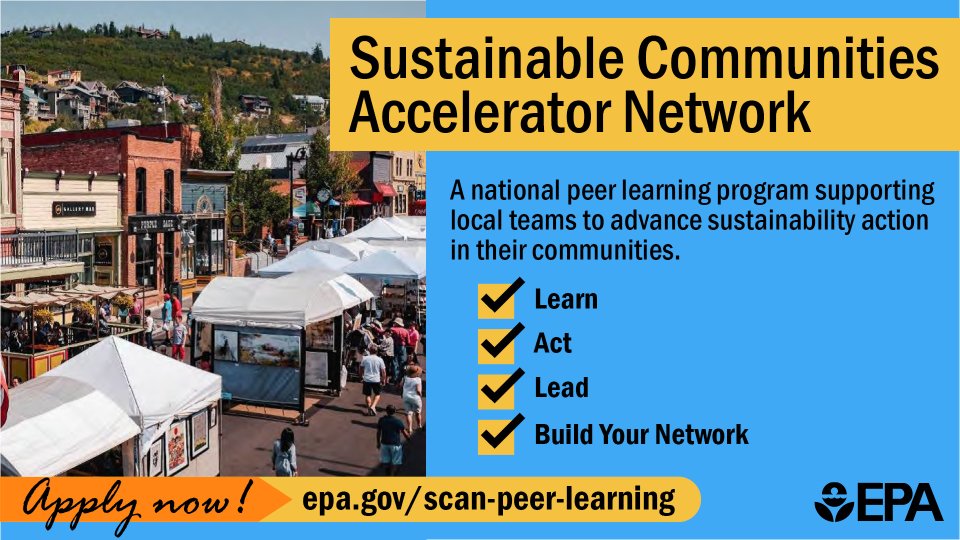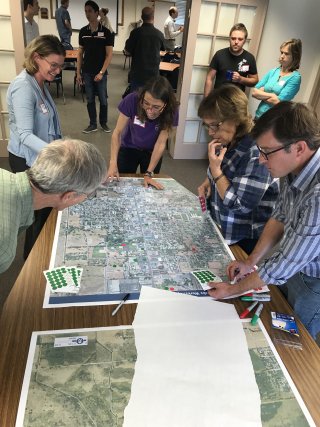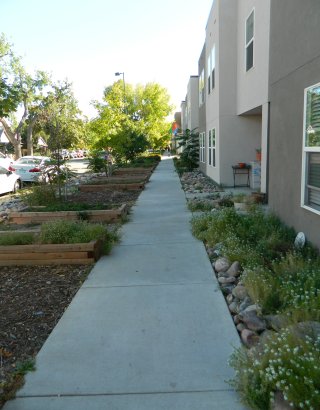Sustainable Communities Accelerator Network
The Sustainable Communities Accelerator Network, a national peer learning program, supports local leaders in implementing plans to prioritize sustainability actions in their communities.
Communities often face challenges to implementing sustainability plans. To overcome barriers, community leaders and local government professionals may need support to maintain momentum. The Sustainable Communities Accelerator Network will expand the capacity of teams to move an idea from paper to action and enable participants to share experiences and learn from one another.
On this page:
About the Program

Each community-based team is implementing one specific local policy or action in their community during the course of the program.
This program is offered in collaboration with the Smart Growth Network, a national alliance of advocates, practitioners, policy makers and local leaders working towards a shared vision for land use and infrastructure policies and actions that result in healthy, sustainable, equitable, and prosperous communities for all.
Participants in the Sustainable Communities Accelerator Network also have access to the collective expertise of the Smart Growth Network as they work through challenges to implement a local policy or action in their community.

Participants benefit from the opportunities listed below.
- Build their network: Develop relationships and explore opportunities to collaborate and problem-solve with leaders in your field from across the nation.
- Learn: Hear from national experts and explore new models related to sustainability and land use from across the country and assess how these models might work in your own community.
- Act: Move their community’s priorities from planning document to action with support from program facilitators and peers.
- Lead: Share their expertise and experiences on a national scale and receive recognition for your their to advance environmental goals.
Structure and Schedule
The seven-month program supports local professionals through:
- Six three-hour virtual workshops.
- Ongoing, asynchronous networking and idea-sharing.
- One full-day, concluding convening (in-person/hybrid).
- Optional webinars and Smart Growth Network Quarterly Discussions throughout the year.
In 2025, virtual workshops are scheduled to take place on the following dates:
- January 14
- February 11
- March 11
- April 8
- May 13
- June 10
A final, full-day convening is tentatively scheduled for Tuesday, July 22, location to be determined.
There is no cost to join the program, but teams will be responsible for their own travel costs for the in-person convening. Limited stipends may be available based on need.
Read the full participant expectations agreement.
Participants are required to attend all workshops and the final convening.
Curriculum
The Sustainable Communities Accelerator Network curriculum incorporates land use, disaster resilience, community engagement and infrastructure content. Participants also have the opportunity to share their expertise with the cohort, work collaboratively on elements of project implementation and build their leadership skills. Asynchronous learning is fostered between each virtual workshop through a communication tool.
Each virtual workshop includes:
- Presentations on emerging and relevant topics related to the themes listed above.
- Peer learning discussions showcasing success stories among cohort members.
- Small group activities focused on project implementation.
- Leadership and professional development modules on topics such as public communication, engagement, conflict resolution, demystification of grant processes and public data tools.
Eligibility

This program is designed for leaders in the environmental, land use planning and sustainability fields. Each community nominated a team of up to two leaders to participate in the seven-month program.
The community must be prepared to undertake a specific project, action or policy that prioritizes sustainability in their local community, such as:
- Activating vacant lots, including brownfields.
- Creating community gardens.
- Creating tree planting programs.
- Advancing resiliency hubs.
- Restoring and protecting healthy streams.
- Promoting green infrastructure.
- Installing electric vehicle charging stations.
- Improving pedestrian and bike infrastructure.
- Addressing zoning for increasing housing near transit hubs.
Note that this is a non-exhaustive list, and communities are invited to work towards other sustainability priorities as part of this program as well.
Each team must include at least one person, employed by a municipal or Tribal government or by a metropolitan or regional planning organization, who is responsible for the implementation of a completed plan (e.g., action plan, neighborhood plan, comprehensive plan, sustainability plan, climate action plan). This staff person must have the support of their leadership (e.g. agency/department chief executive or Mayor).
The second team member can be from a different government or planning organization as listed above, or a community-based organization. Representation from a local community-based organization is highly encouraged.
If it is not possible for two different organizations to be represented, applicants from two branches of the same government or organization may apply. If a team application is not possible, individuals may also apply.
How to Apply
The request for applications closed on Wednesday, November 20th at 5:00 PM ET.
